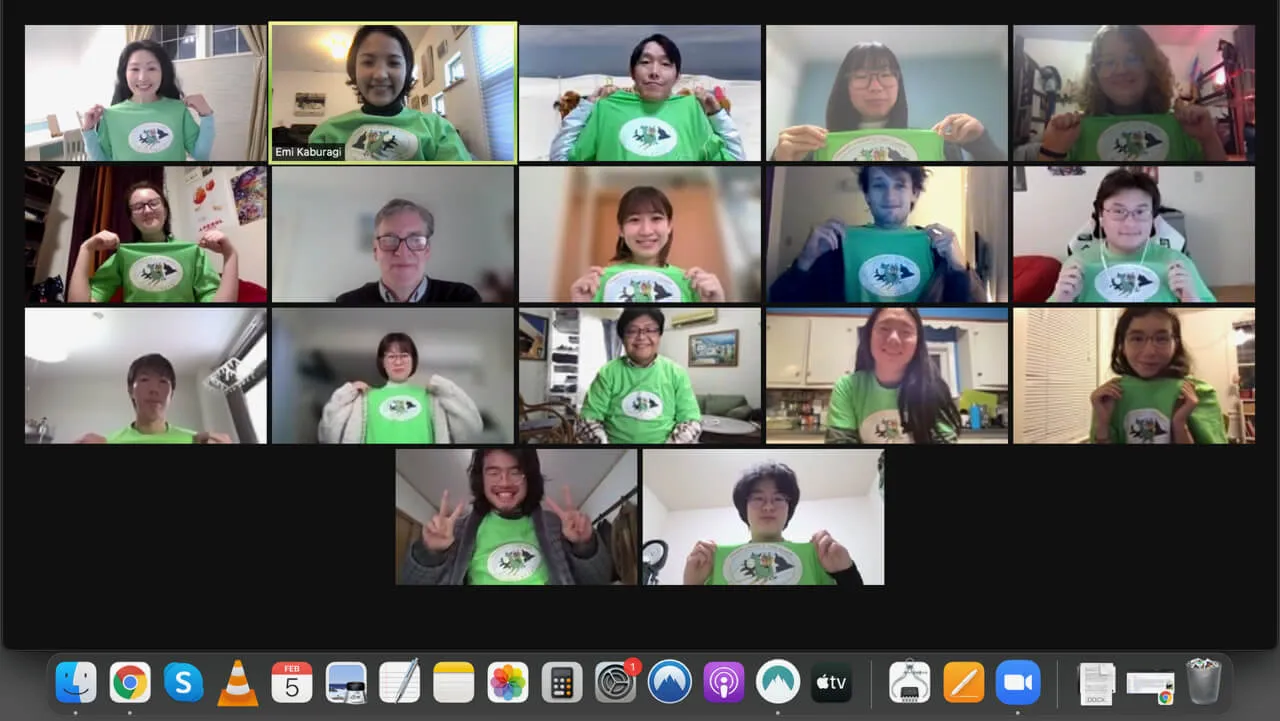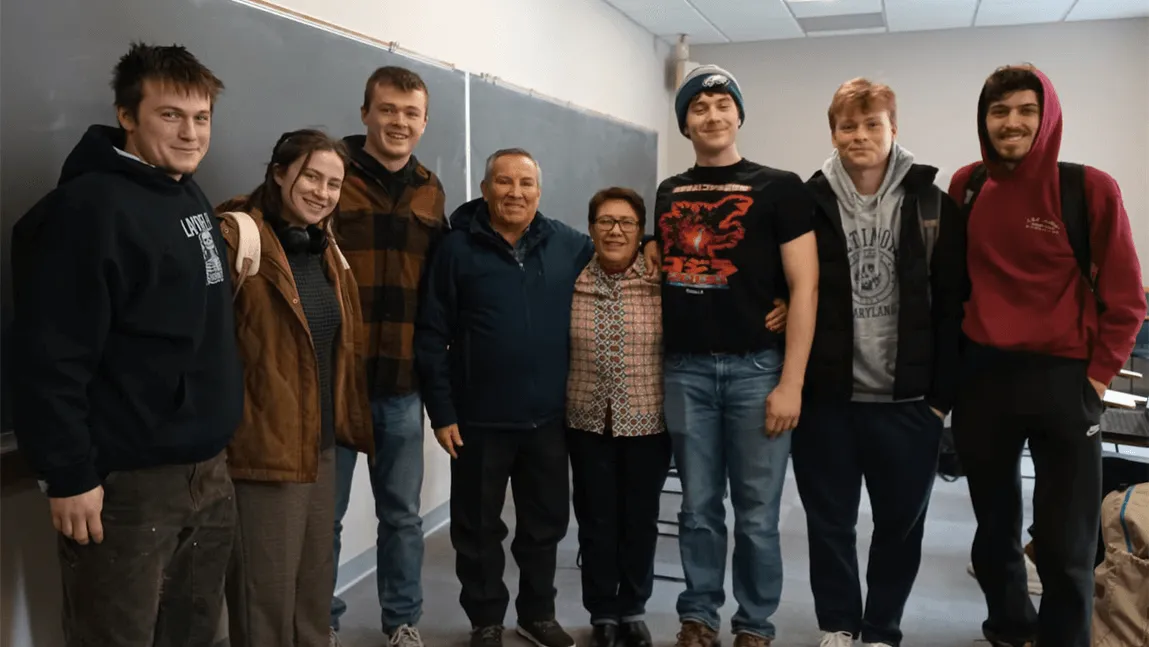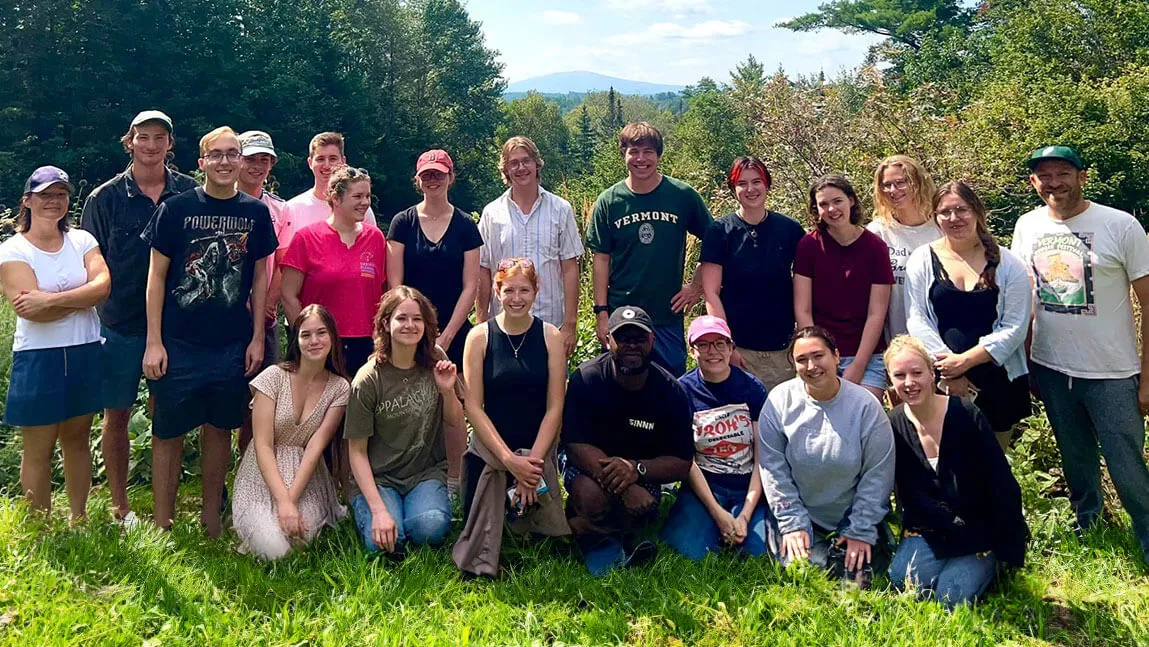In UVM’s College of Arts and Sciences (CAS), more and more faculty members view their classrooms as being without walls—or borders. They see themselves as guides to an ever more globalized world for their students, making the most of their international connections to create unique and exciting pathways for global learning. Through initiatives such as service-learning classes, community outreach, study abroad, talks featuring speakers from different countries, and workshops aimed at problem solving, these faculty members offer invaluable experiences for students in an increasingly connected world.
Excellent opportunities are also available through UVM’s robust Study Abroad program, in which students travel to other countries to immerse themselves in the culture, attend classes, and improve their language skills (though there are English-speaking destinations to choose from, too). And the Global Career Accelerator (formerly Global Tech Experience) gives students the chance to collaborate with colleagues from different cultures and backgrounds.
Within CAS, the featured classes, programs, and projects we’re about to introduce to you demonstrate this same high level of excellence in global initiatives. Merely a sampling of what CAS has to offer, they’re also wonderful examples of the faculty’s efforts to develop new connections, nurture longstanding ones, and offer truly inspiring learning experiences.
Enhancing Intercultural Relationships
What: Collaborative Online International Learning Project
When: Fall semester through the end of January
Who can participate: Students taking Japanese 1200 or higher
Country involved: Japan
Contact: Kazuko Suzuki Carlson
Each year since 2021, UVM students taking advanced Japanese classes have participated in a Collaborative Online International Learning (COIL) project with students in Japan. “I developed the COIL project with Professor Kaburagi from Tottori University in 2021 when there was a call to start up a university-level collaboration to enhance the sister-state relationship between the state of Vermont and Tottori Prefecture, Japan,” says Kazuko Suzuki Carlson, senior lecturer in Japanese in the School of World Languages and Cultures.
Due to the difference between the American and Japanese academic calendars, the project overlaps two semesters, with students from UVM and Tottori interacting in four or five virtual language-exchange sessions each year. They also work together in small groups to prepare presentation materials in their target language, collaborate during and outside of language sessions on cooperative assignments, and eventually join forces to create a design (for items such as T-shirts) showcasing the products and features of both Vermont and Tottori. The designs are judged by all participants and the Tottori Prefectural Government Office, which awards prizes. Every student receives a product featuring their design or materials that display their work.
“Tottori Prefectural Government Office has been actively supporting this project by participating in virtual language-exchange sessions, providing prizes, and sending its staff to visit UVM,” Carlson says. She adds that the COIL project “provides students an opportunity to put their knowledge to use by communicating, working together, and collaborating with native speakers of Japanese.”
Expanding Community Outreach
What: Hispanic Voices and Hispanic Tales
When: Hispanic Voices: each semester when enough native speakers can participate; Hispanic Tales: each semester
Who can participate: Intermediate students taking Spanish 051 or 052 (Hispanic Voices); beginner students taking Spanish 1100 or 1200 (Hispanic Tales)
Countries involved: Argentina, Chile, Colombia, Cuba, Honduras, Mexico, Peru, Puerto Rico, Spain, Venezuela, and other Spanish-speaking countries
Contact: Adriana Sanchez-Gutierrez
Since spring of 2023, the voices of UVM students in conversation with native Spanish speakers have greeted the ears of Vermont Public listeners thanks to a program called Hispanic Voices. A service-learning project created by Adriana Sanchez-Gutierrez, Ph.D., lecturer of Spanish in the School of World Languages and Cultures, Hispanic Voices helps intermediate students hone their Spanish-speaking skills and offers a voice to the Hispanic community of Vermont. Native speakers who live in Vermont and hail from different Spanish-speaking countries and regions participate in the program, in which students interview them three times—the first two to get acquainted and the third to be edited and produced by Vermont Public. The interviews are also aired on public radio in Indiana, Miami, and Madrid.
Beginner Spanish students also have an opportunity to improve their Spanish-speaking skills through a new service-learning program called Hispanic Tales. Through this project, UVM students read Indigenous and Afro-Hispanic tales in Spanish to K–12 students. Sanchez-Gutierrez has already established a partnership with the school boards of Addison Central School District and Champlain Valley School District. The first in-person meeting was held at the Williston Central School in fall of 2023, when UVM students read the Indigenous tale El Mito from the Uitotos community in the south of Colombia. The Spanish students are assigned three journals and a final portfolio project that includes a video for K–12 students based on the tales they read. The project will eventually offer a virtual library to school boards in Vermont.
“I consider both of these courses important because students are encouraged to learn and serve the community,” Sanchez-Gutierrez says. “Also, a foreign-language learner can understand multicultural awareness better when they are committed to creating a final project with a community partner.”
Learning to Serve
What: Migration Studies Project
When: Fall semester
Who can participate: Any UVM student who enrolls in Introduction to Migration Studies (ANTH1990, POLS1990)
Countries involved: Primarily Mexico, Venezuela, and Central American countries
Contact: Caroline Beer or Sarah Osten
In an effort to educate students about the causes and consequences of immigration in the Americas, Caroline Beer, Ph.D., professor in the Department of Political Science, and Sarah Osten, Ph.D., associate professor in the Department of History, began offering the first of two team-taught interdisciplinary courses in the fall of 2023. The first course, Introduction to Migration Studies, is a large, lecture-style class aimed at first-year students that provides basic background information on the history, politics, and culture of immigration in the United States. It is a pre-requisite for the second course, Migration Case Research, a workshop-style seminar that will offer highly qualified seniors the chance to work with faculty and lawyers on active asylum cases.
Osten will teach the workshop/seminar for the first time in the spring of 2025. The course will offer hands-on experience for students hoping to work in immigration-related fields—specifically, conducting country conditions research for active asylum cases, including those of political dissidents and others experiencing various forms of persecution.
Beer notes that there are millions of human beings whose lives are affected by the policy choices made by the U.S. government in relation to immigration. “Immigration has become a central political conflict in U.S. society,” Beer says. “Students need to understand the immigration situation to understand the current political situation.”
Getting Acquainted with Northern Neighbors
What: Field trip to Canada
When: Fall semester
Who can participate: Students taking History 2555
Country involved: Canada
Contact: David Massell
This past October, students taking the Canadian-American Relations class journeyed to Canada’s capital city of Ottawa for a three-day field trip. “It has been an important UVM tradition since the 1960s,” says David Massell, Ph.D., professor and director of undergraduate studies in the Department of History. In past years, the trip has been linked to other UVM courses, including History of Canada, Due North: An Introduction to Canada, and From Pucks to Parliament.
For at least the last 15 years, the trip has been a collaboration between UVM and St. Michael’s College (SMC), co-led by Massell and SMC Professor of Political Science Jeffrey Ayres. This past fall’s trip successfully resumed for the first time since before the COVID-19 pandemic. Students attended a briefing on Canada–United States relations with Member of Parliament John McKay, took a walking tour of Parliament Hill and tours of the National Gallery and the Canadian Museum of History, enjoyed an Ontario Hockey League game between the Ottawa 67s and the Peterborough Petes, and still had plenty of time to explore the city and interact with its residents.
“Walking into the classroom on the day following the trip,” Massell says, “the students are chatting, laughing, sharing. A trip like this builds a community of learners in a way that elevates the level of interaction and conversation for the rest of the semester.” He adds that it is one thing, for example, to teach how the Canadian game of hockey became a continental spectacle starting in the 1920s. It is quite another to attend a game and witness the intensity of the fans, hear the bilingual announcements, and see the families with children taking in their favorite sport. “Everything we see and do in Ottawa really brings history to life.”
Trading Places for Greater Understanding
What: Sciences Po Saint-Germain-en-Laye Student Exchange Program
When: Each semester or the full academic year
Who can participate: Students who meet eligibility requirements
Country involved: France
Contact: UVM Study Abroad Team
One of 30 exchange programs available to UVM students, Sciences Po Saint-Germain-en-Laye “offers high levels of immersion and is very affordable,” says Carolyn Bernegger, Study Abroad Advisor in the Office of International Education. Located in Saint-Germain-en-Laye, a historic town in France about a 40-minute train ride from Paris, Sciences Po is a prestigious institution that offers an intimate setting (about 800 students) and is widely recognized for its quality of education and overall academic experience.
“Sciences Po Saint-Germain-en-Laye academics focus on history, political science, and global and regional studies,” Bernegger says, “so, while the exchange is open to students from all majors, it is best suited to students planning to take those subject areas.” She adds that entering a French university as an exchange student requires significant levels of maturity, independence, and the ability to self-advocate.
“For every one student from Saint Germain-en-Laye who comes here for an academic year," says Meaghan Emery, Ph.D., associate professor of French, “one UVM student must go there for the year, or two UVM students for a semester.” She says feedback from the French students has been very positive, and UVM students who have returned from Sciences Po speak enthusiastically about the variety of course offerings and extracurricular activities, as well as the lasting friendships they forged.
Courses are taught in both French and English, so students can select them based on their proficiency level in addition to their academic interests. Interested students may also apply for internships on campus or in the town offices—both excellent ways to immerse themselves in their new community.
Taking a Deep Dive into Another Culture
What: Study-abroad class in Brazil
When: Every year during the winter break session
Who can participate: Students who meet UVM Study-Abroad eligibility requirements
Country involved: Brazil
Contact: Paula Higa or D. Thomas Toner
During the winter break, students enrolled in Afro-Brazil: Arts, Culture, and History travel to Brazil for a 10-day immersion that focuses on Afro-Brazilian culture and its impact on the history of Brazil. The class, led by Paula Higa, assistant professor and resident choreographer in the School of the Arts’ Theatre and Dance Program, and D. Thomas Toner, professor in the Music Program, takes place in the state of Bahia’s capital city of Salvador. Visits to historical landmarks and museums; practical workshops in Afro-Bahian dance, capoeira (a Brazilian martial art), graffiti, and percussion; and lectures on Afro-religion, African diaspora, politics, and race in Brazil are all part of the curriculum.
According to Higa, the course covers a diverse array of study areas, including Africana studies, anthropology, dance, Latin American studies, music, religion, political science, and sociology, among others. It allows students to expand their cross-cultural communication skills, develop a global perspective, and increase their adaptability to new environments.
Higa adds that apart from the unique cultural experiences, students will broaden their academic and personal horizons and develop skills that can benefit them in their future endeavors. “These skills are invaluable in today’s globalized world and can enhance one’s employability and career prospects,” she says. Of course, there’s also an immediate benefit: They get to take a break from the Vermont winter to enjoy summer in Brazil.
Promoting Civil Discourse Across Continents
What: Global outreach and support
When: Ongoing
Who can participate: Members of the Lawrence Debate Union (open to all students)
Country involved: Tanzania
Contact: Helen Morgan-Parmett
The Lawrence Debate Union (LDU) continues its long history of global outreach under the direction of Helen Morgan-Parmett, Ph.D., professor of forensics, director of speech and debate in the Department of English, and current co-director of the LDU. The most recent effort involves a relationship with debate students from Tanzania that got off to an auspicious start this past fall.
In November 2023, five students from two universities in Dar es Salaam and one representative from the Tanzania Competitive Rhetoric Organization came to UVM and participated as debaters and judges in the UVM-hosted Huber Debates Tournament against teams from across the United States. They then stayed the week in Burlington, hosted by students from the LDU. “During their stay, we hosted debate practices and trainings and engaged in cultural activities, including driving over the Notch, visiting the Cold Hollow Cider Mill, and visiting the Fleming Museum,” Morgan-Parmett says.
This coming June, UVM will take nine students and four coaches to Tanzania to put on a two-week debate workshop for students at the University of Dar es Salaam and for teachers in Zanzibar. The workshop will include two tournaments alongside debate and public-skills training at the novice and advanced levels.
“Global debate is now more important than ever,” Morgan-Parmett says. “Our students must be global citizens, with a respect and understanding for other people, their cultures, and their perspectives on the world.”


